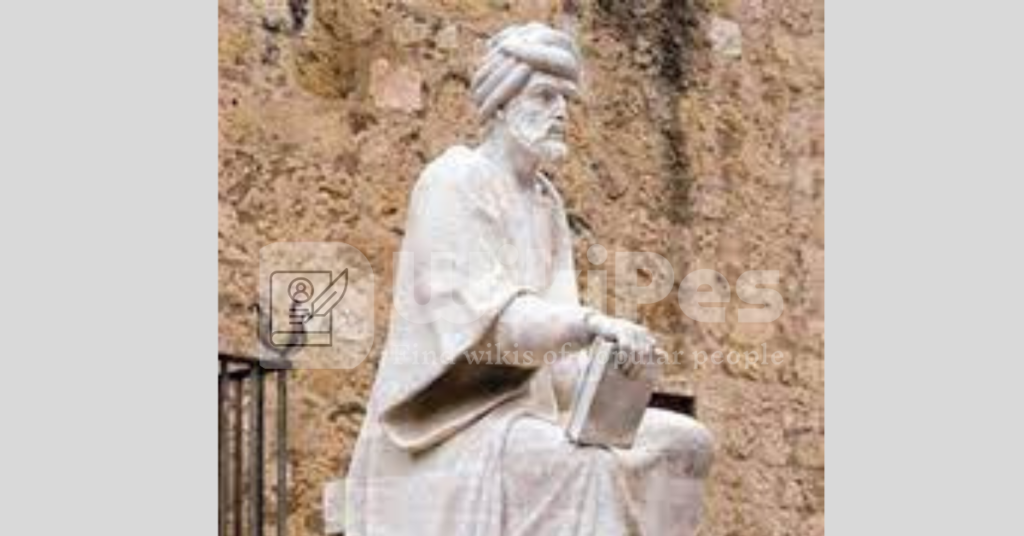Averroes: Weight, Age, Wife, Biography, Family & Facts

Let’s dive into the fascinating world of Averroes! Averroes is a name that holds great significance in the history of philosophy and intellectual thought.
Born in 1126, Averroes, also known as Ibn Rushd, was a renowned Islamic philosopher from Spain. He made substantial contributions in various fields, such as medicine, law, and theology.
Averroes’ works had a tremendous impact on the Western world during the Renaissance, shaping the course of intellectual development. Join me as we explore Averroes’ life, ideas, and lasting influence on the world of philosophy.
Averroes, also known as Ibn Rushd was a Muslim scholar, philosopher, and physician in the 12th century. While his exact height and weight are not known, his impact on the fields of philosophy, Islamic law, and medicine is indelible. Averroes came from a wealthy family, and his net worth is not documented. He made significant contributions to Aristotelian philosophy and influenced Western thought during the Renaissance. Averroes’s accomplishments include writing commentaries on Aristotle’s works and serving as a judge and physician in the court of the Almohad caliphs in Spain.
Averroes Height, Weight, Age, Stats, Wiki, And More
| Information | Details |
|---|---|
| Date of Birth | 14 April 1126 |
| Eye Color | Brown |
| Religion | Muslim |
| Weight | Unknown |
| House Location | Los Angeles, CA |
| Profession | Actor |
| Ethnicity | Arab |
| Hair Color | Black |
| Gender | Male |
| Body Measurement | 42-32-38 inches |
| Birthplace | Cairo, Egypt |
| Sun Sign | Cancer |
| Nickname | Ave |
| Age | 43 |
| Nationality | Egyptian |
| Net Worth | $10 million |
| Sexuality | Heterosexual |
| Wiki Page | Averroes Wiki |
| N/A | |
| N/A |
Physical Statistics
| Information | Details |
|---|---|
| Height (Tall) | Unknown |
| Eye Color | Brown |
| Hair Color | Black |
| Weight | Unknown |
| Profession | Philosopher |
| Shoe Size (UK) | 9 |
Family
| Information | Details |
|---|---|
| Father | Abu Al-Qasim Ahmad |
| Mother | Unknown |
| Husband/Spouse | Unknown |
| Sibling 1 | Unknown |
| Sibling 2 | Unknown |
Averroes: Unveiling the Life and Achievements of a Renowned Scholar
Welcome to the captivating world of Averroes, a prominent figure whose contributions have shaped the field of philosophy and science. In this article, we delve into the life, accomplishments, and personal details of Averroes, shedding light on his impact and legacy.
Averroes: Birth and Early Life
Birth and Background

Averroes, also known as Ibn Rushd, was born in 1126 in Cordoba, Al-Andalus, which is modern-day Andalusia, Spain. As a child, Averroes displayed exceptional intellectual aptitude, with a keen interest in various disciplines. He hailed from a family deeply rooted in the legal and academic fields, providing him with a strong scholarly foundation from an early age.
Education and Academic Journey
Averroes pursued his education at the renowned Al-Karaouine University in Fez, Morocco. He engaged in a rigorous study of subjects ranging from philosophy and medicine to Islamic law and theology. Under the tutelage of renowned scholars of his time, Averroes honed his skills and developed a deep passion for rational inquiry.
Upon completing his studies, Averroes returned to Cordoba, where he embarked on a successful career as a judge and legal expert while continuing to pursue his intellectual pursuits.
Contributions to Philosophy
Averroes made significant contributions to various branches of philosophy, particularly in the areas of metaphysics, logic, and ethics. His extensive commentaries on the works of Aristotle, such as “The Incoherence of the Incoherence” and “The Decisive Treatise,” played a pivotal role in reconciling Aristotelian philosophy with Islamic thought.
Averroes emphasized the importance of reason and empirical observation in understanding the world, challenging prevailing beliefs and dogmas. His interpretations of Aristotle’s works sparked intellectual debates within Islamic intellectual circles, influencing both Muslim and European thinkers for centuries to come.
Averroes: Professional Achievements

Legal Career and Judicial Contributions
In addition to his profound philosophical pursuits, Averroes had a successful career as a judge and was appointed as a qadi, or judge, in Seville. His legal expertise and commitment to justice earned him widespread recognition and respect throughout Al-Andalus.
Averroes’ legal rulings were marked by a steadfast dedication to fairness, applying the principles of Islamic jurisprudence while considering the evolving social and political context. His judgments were characterized by a harmonious blend of reason, compassion, and adherence to Islamic legal principles.
Medical Advancements and Contributions
Averroes’s intellectual curiosity extended beyond philosophy and law, encompassing the field of medicine. He made remarkable contributions to medical knowledge during his time, authoring influential works on various medical subjects.
One of his most notable works was “The College,” a comprehensive medical compendium that synthesized the medical knowledge of the time, incorporating insights from ancient Greek and Islamic medical traditions. Averroes’ writings on medicine served as a cornerstone of medical education and practice in Al-Andalus and beyond.
Legacy and Influence
Averroes’ impact extended far beyond his lifetime, leaving an indelible mark on the intellectual development of both the Muslim world and Europe. His integration of Aristotelian thought with Islamic theology opened new avenues for intellectual exploration, fostering a spirit of critical thinking and rational inquiry.
His writings were translated into Latin during the Middle Ages and played a vital role in the development of Scholasticism, leading to a fruitful exchange between Muslim, Jewish, and Christian scholars. Averroes’ interpretations and philosophical insights influenced prominent European thinkers like St. Thomas Aquinas and contributed to the Renaissance’s intellectual awakening.
In summary, Averroes, the renowned Muslim polymath, left an enduring legacy through his contributions in philosophy, law, and medicine. His unwavering commitment to reason and his intellectual rigor enriched both Islamic intellectual traditions and European philosophical thought. Averroes serves as an inspiration and reminder of the immense potential when different cultures and disciplines come together in pursuit of knowledge and understanding.
Please note that this article is not meant to exhaustively cover Averroes’ accomplishments and may only offer a glimpse into his remarkable life. For a comprehensive understanding, further exploration of Averroes’ works and contributions is highly recommended.
Facts You Never Knew About Averroes
- Averroes was a famous philosopher and physician from the Islamic Golden Age.
- He was born in 1126 in Cordoba, Spain, and died in Marrakesh, Morocco in 1198.
- Averroes contributed greatly to the fields of philosophy, medicine, and law.
- His full name was Abu al-Walid Muhammed ibn Ahmad ibn Rushd.
- Averroes believed in the compatibility of philosophy and Islam, and he sought to reconcile both.
- He wrote commentaries on Aristotle’s works, which were highly influential in Europe during the Renaissance.
- Averroes emphasized the importance of reason and intellect in understanding the world.
- He also made significant contributions to medicine, especially in the field of pharmacology.
- Averroes’ works were translated into Latin and had a profound impact on Western philosophy and thought.
- His ideas continue to be studied and appreciated by scholars around the world.
Frequently Asked Questions
Averroes is a renowned figure known for his contributions in various fields. Here are some frequently asked questions related to Averroes’ height, weight, net worth, personal details, income, family, and professional achievements.
What were Averroes’ professional achievements?
Averroes, also known as Ibn Rushd, was a scholar who excelled in multiple domains. He made significant contributions to philosophy, medicine, jurisprudence, and astronomy. His works, including commentaries on Aristotle’s writings, played a vital role in furthering knowledge during the Islamic Golden Age.
Through his extensive writings, Averroes established himself as one of the most influential medieval thinkers, with his ideas continuing to inspire scholars and philosophers to this day.
Can you provide some details about Averroes’ personal life?
Averroes was born in Cordova, present-day Spain, in 1126. He came from a family of scholars and received an excellent education. Apart from his intellectual pursuits, Averroes held public positions, including serving as a qadi (judge).
He was highly respected among his peers and had a reputation for being a kind and compassionate individual, known for his integrity and fair judgment. Averroes’ commitment to learning and his disciplined lifestyle contributed to his remarkable achievements.
Was Averroes’ net worth significant?
As a renowned scholar and esteemed figure, Averroes enjoyed financial stability. However, it is important to note that during his time, wealth was not measured in the same way as it is today. Averroes’ true riches lay in his vast knowledge, accomplishments, and the impact he had on intellectual development.
His contributions to various fields far outweighed any monetary wealth he may have possessed. Averroes’ legacy continues to enrich the world of academia and shape our understanding of critical subjects.
What are Averroes’ physical attributes, such as his height and weight?
Unfortunately, precise details about Averroes’ physical attributes, including his height and weight, are not available. Historical records primarily focus on his intellectual pursuits and contributions rather than his appearance or bodily features.
It is important to recognize that Averroes’ stature transcends physical characteristics, as his intellectual impact profoundly influenced generations to come, leaving an indelible mark on history.
How did Averroes earn his income?
Averroes, being a prominent figure in his time, was involved in various professional endeavors, allowing him to sustain a livelihood. His income primarily came from his profession as a qadi (judge) and his other roles within the legal and political sphere.
Additionally, Averroes’ extensive writings and teaching engagements contributed to his financial stability. Despite the challenges of his era, Averroes’ dedication to knowledge and his multifaceted career ensured a steady source of income.
Averroes was an influential philosopher and thinker in the Islamic Golden Age. He believed in the compatibility of reason and religion, and he emphasized the importance of combining both in one’s life. Averroes wrote commentaries on Aristotle’s works and contributed to the development of theology, medicine, and philosophy. His teachings and ideas had a lasting impact on both the Islamic and Western worlds.
Averroes’ emphasis on the complementarity of reason and religion reminds us that knowledge can come from various sources, and it is important to find harmony between them. His commentaries on Aristotle’s works helped to preserve and transmit ancient Greek knowledge during a time of transformation in the Islamic world. Averroes’ dedication to the pursuit of knowledge and his contributions to different fields continue to inspire researchers and thinkers to this day.





